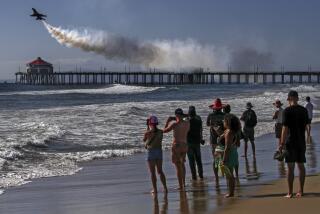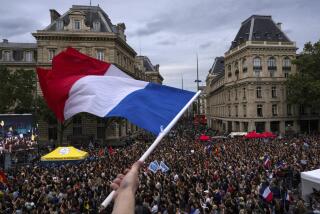Air Show Paying Price for France’s War Stance
- Share via
The no-shows are piling up at the Paris Air Show.
With French-American relations still cool over France’s opposition to the U.S. invasion of Iraq, major U.S. aerospace firms have dramatically scaled back or canceled their participation in the world’s oldest and biggest industry gathering.
Lockheed Martin Corp., Boeing Co. and Northrop Grumman Corp. -- the world’s three largest defense contractors -- have cut by as much as half the number of people they plan to dispatch to the show, which starts June 15. Those who attended the last show but will snub the weeklong event this year include Chief Executives Philip Condit of Boeing and Daniel Burnham of Raytheon Co.
Other companies, including General Dynamics Corp., Textron Inc. and L-3 Communications Corp., also have pulled out as exhibitors and won’t be hosting parties, though a few of their employees may well show up.
“Almost every company is cutting back because the Department of Defense won’t be there” in large numbers, said Joel Johnson, vice president for international affairs for the Aerospace Industries Assn. “The bottom line is that this will be a reduced show.”
Last month, the Pentagon, citing the demands of the deployment in the Persian Gulf, said no U.S. military officer over the rank of colonel would be in Paris for the show. Although military officials haven’t publicly called that a retaliatory move against the French, they say privately that the Pentagon’s message should be clear.
The French certainly got it: At a news conference in Paris on Monday, Yves Bonnet, director of the Paris Air Show, said the U.S. reduction in force was “clearly a punishment.”
For the first time in decades, there will be no flight demonstrations by U.S. military aircraft, including the F-16 fighter jet, which has been a staple of the Paris show since the jet was introduced there in 1975. The number of American military aircraft on display will total six, down from 13 at the last Paris show in 2001.
Moreover, there will be no U.S. generals with huge entourages prowling the grounds of Le Bourget Field, touting U.S. weapons. And not a single congressional delegation is scheduled to attend, in part because some in Congress still are smarting over French criticism of the Iraq war and disparaging remarks made by France’s president about President Bush’s decision to invade.
“President [Jacques] Chirac intentionally embarrassed my president, which in effect embarrassed all of us,” House Appropriations Committee Chairman C.W. “Bill” Young (R-Fla.) said Tuesday.
Young has banned committee members and staff from attending. As committee chairman, Young must authorize any travel expenses for the show, whose theme this year is French-American cooperation through the years since the Wright brothers’ first flight 100 years ago.
Big defense companies usually spend millions at the event, housing dozens of executives in $1,000-a-day suites, renting out the coveted viewing “chalets” next to the runways that cost $250,000 or more and holding receptions at ritzy hotels. In the past, some companies sent as many as 500 employees.
Two years ago -- the show is held every other year -- Lockheed hired more than 35 limousines to ferry executives from Paris hotels to Le Bourget, where the air show is held. This year, Lockheed Martin expects to send only about half its normal contingent, or about 100 to 120 people, saving the company $1.5 million.
“Our reduction is based on several factors, including the geopolitical situation in the world and the cost,” Lockheed spokesman Tom Jurkowsky said. Lockheed’s largest customer by far is the Pentagon. “We don’t need their approval,” he added, “but we certainly consider their perspective.”
A sure sign the show won’t draw the usual crowd: Hotel rooms haven’t been hard to find, said Jon B. Kutler, president of investment bank Quarterdeck Investment Partners Inc. and a 20-year veteran of the Paris Air Show.
“In the past, you had to reserve a room at least a year ahead. This may be the least productive show in terms of how there may not be enough senior people to talk to,” he said.
But experts say that is unlikely to hurt sales because major defense contractors travel the world year-round to close deals and don’t focus on just one industry event to win contracts.
The Paris Air Show dates to 1909 and reached its zenith during the Cold War arms buildup. Aerospace companies then used the event to showcase their new planes and weaponry and would announce major deals in Paris.
Kutler said that the days when people shook hands and closed deals in Paris were over but that the show remained the best place to build business relationships. It’s the only affair, he said, where you can meet a dozen aerospace executives in a single day.
French organizers are taking great pains to downplay the transatlantic political tensions and are insisting that they expect a strong U.S. presence. About 277 exhibitors from the U.S. have signed up; the show will have a total of 1,623 exhibits this year, down from 1,865 in 2001.
“The United States and France have always supported each other and share a common experience. This will be illustrated during this exhibition,” the organizers said in a statement. “The Americans who are used to exhibiting at the Paris Air Show have once again registered, and their participation is maintained.”
The organizers are right, according to U.S. industry officials, because many American companies paid for exhibition space long before the Iraq war and can’t afford to back out now.
“It’s a good excuse to cut back, but if you’ve got something to sell, you’ve got to go,” said Gilbert Speed, publisher of an industry newsletter for aerospace suppliers.
The industry “has been looking for ways to reduce the cost of participating in the air show since the end of the Cold War,” said Jim Fetig, a Raytheon spokesman. The nation’s fourth-largest defense firm expects to send about 80 people to Paris, down from about 140 in 2001. “We’re going to continue to assess our presence and review the show year by year,” he said.
But Kutler noted that having the air show in Paris has distinct, timeless advantages.
“People ask me why if the U.S. has the biggest aerospace industry, the biggest show is in Paris,” he said. “And I tell them it’s because the wives of the chief executives would rather go to Paris than to Dayton, Ohio.”
More to Read
Inside the business of entertainment
The Wide Shot brings you news, analysis and insights on everything from streaming wars to production — and what it all means for the future.
You may occasionally receive promotional content from the Los Angeles Times.










